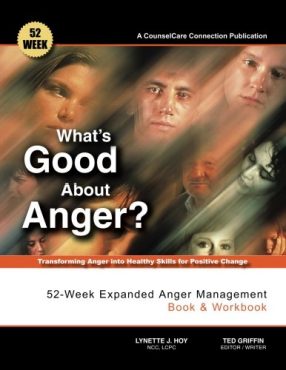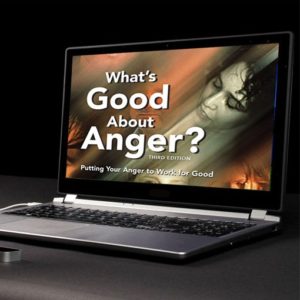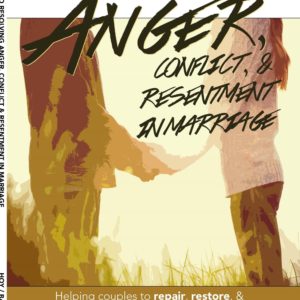Are you mandated by a court, employer, school or institution to take an anger management course? This certificate course includes the expanded What’s Good About Anger? 52 week/hour/lesson combination book/workbook with Video on flash drive (65 min), quizzes, final exam, 3 phone training sessions for Illinois residents (optional), recommendations and a certificate of completion. The first 26 lessons can be completed online. The rest of the lessons can be completed in print. This course is geared for a general readership (2016 edition) including the topics below. Many courts and employers throughout the USA have approved our online and home study anger management courses. This program is offered by Lynette J. Hoy,
a National Certified Counselor, Marriage and Family Counselor, Licensed Clinical Professional Counselor (in State of Illinois), Anger Management Specialist-V, Supervisor, Consultant and Diplomate with the National Anger Management Association, Domestic Violence Advocate, Crisis Counselor and Anger Management Specialist. Lynette is the co-author of all editions of What’s Good About Anger?, the author of all the workbooks and training manuals. Mrs. Hoy has trained thousands of students, counselors and clients in anger and conflict management.
The 52-week course covers the following topics and goals:
In What’s Good About Anger? co-authors Lynette Hoy and Ted Griffin teach how to decrease stress and turn anger into assertiveness, problem-solving, conflict management, empathy and forgiveness! Participants learn to identify the problem, power and process of anger (from annoyance to bitterness or rage); effective examples of “good anger”; and how research-based skills can effectively manage anger and be used to accomplish personal and relational goals.
Participants will gain a new perspective on anger, how to prevent flare-ups and how to better manage responses to provoking situations. Chronic anger can be costly – physically, emotionally and relationally. Most people can use their anger in appropriate ways in some situations, and yet can be ineffectual or harmful in other situations. Participation in this anger management course can reduce levels of anger, and help individuals learn ways to direct anger into healthy, effective coping behaviors to stop escalation and to resolve conflicts.
Logging anger, triggering situations and applying new approaches helps individuals to contain and manage anger. Goals: To reduce levels of anger in provocative situations. To learn effective coping behaviors in order to halt escalation of anger and to resolve conflicts. To maintain and consistently develop effective skills for managing anger and building healthy relationships.
Course Outline
Instructions
Lessons (each lesson equals one hour of course work):
Part One: Overview of Anger
- Anger: friend or foe?
- The Process of Anger – it’s triggers
- What IS Good About Anger?
- Defusing Anger by Managing Stress
- Handling Anger Effectively
- Anger and Assertiveness
- Managing Conflict
- Turn Your Anger into Forgiveness
- When to Take a Time-Out
- Plan to Change Your Life by Changing Your Thinking
Part Two: Building Personal & Relationship Skills to Drain Anger
- Empathy and Emotional Intelligence
- Building Successful Relationships
- Case Study Application
- Reinterpreting Judgments and Expectations
- Choosing Behavior Alternatives
- Assertiveness Skills and The ASERT Approach
Part Three: Managing Conflict and Anger – Not People
- Evaluating Your Conflict Style
- What’s Good About Conflict?
- Keys to Collaboration
- Stopping Aggression
- Winning or Resolving Conflict Amicably?
- Applying the SUM-UP and CONNECT Skills
- Control Issues – Take Responsibility
- Stress Inventory and Personal Adjustment Evaluation
- Stress Relievers
- Conflict and Control Issues
Part Four: Building on the Basics of Anger Management
Lessons (each lesson equals one hour of course work):
- Reviewing the Process of Anger
- What IS Good About Anger?
- Defusing Anger Managing Stress: Part 2
- Handling Anger Effectively: Part 2
- Evaluating Your Progress
- How Motivation Impacts Lasting Anger Management
- Stop Blaming – Accept Responsibility
- Changing Angry Thinking
Part Five: Developing Behavioral and Relational Insights and Strategies for Anger Management
- Relaxation Skills to Break Anger’s Escalation
- The Effect of Expectations on Anger
- Managing Self-Esteem Issues
- Facing the Consequences of Anger
- Responding to Someone Else’s anger
- Screening for Emotional Intelligence
- Forgiveness – Where Anger Ends
- Positive Thinking and Self-talk
- Developing Interpersonal Communication and Conflict Resolution
- Building Empathy Skills: Part Two
- Learning from Anger
- Measuring Your Anger Management Progress
- De-escalating a Confrontation
- Negotiate to Win-Win
- Anger Can Be a Mask
- Building Healthier Relationships
- Increasing Self-Control and Anger Management Skills
- Turning It Over to Your Higher Power
Forms: Anger Survey
Anger Management Progress Report
Empathy Inventory
It is your responsibility to confirm with the judge or your attorney as to whether a distance-learning anger management program will meet the court requirement.






